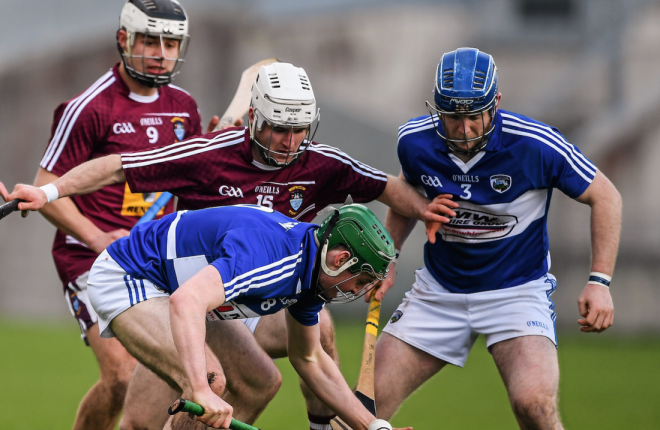
ANOTHER YEAR GONE..Westmeath once again missed out on Division One hurling
IT’S now the annual topic of debate in mid-April. The pros, the cons, the absurd, the reasonable, the unjust and the downright lucky.
The Allianz League format has a marmite quality to it that splits players, managers and supporters – pretty much along the lines of beneficiary and benefactor.
I remember talking to the then Kerry manager Eamonn Kelly after the Kingdom had beaten Antrim to win promotion to Division 1B last year. Prior to the match he had been waxing lyrical about the nonsense of a team winning their league and then having to play another match in order to win promotion.
“I would think that if a team wins their league outright they should be promoted, automatically, same as they would in every other league,” said Kelly beforehand.
In the immediate aftermath of his side’s win over Antrim that secured promotion, it was pointed out that the system for which he had been a champion of change in the previous seven days might benefit his side next year. He opined at that stage with tongue firmly in cheek that “it wasn’t too bad a system.”
Likewise Kevin Ryan who when manager of Carlow backed the eight-team divisions 1 and 2 as a “great system” that allows teams to develop against top flight sides. As Antrim manager he heaped similar praise on the current 12-team Division 1A and 1B structure.
And we’ve all engaged in enough barroom conversation to know that the very hurler on the ditch who was adamant that “there’s no point in any team going up to division one to get hammered every week – it won’t do them any good at all” is that same man is enraged this week by the injustice of Westmeath’s hurlers having to beat Laois or Fermanagh having to beat Tyrone.
Let’s be honest, it’s a bizarre system. One phonecall that I’m 100 per cent certain that never has or never will be received by Croke Park is from the chief executive of a national sporting organisation requesting that some high-ranking officials visit Dublin on a fact-finding mission as they want to model their internal club competition on the GAA.
“Hello Mr Duffy, we love the way your competition structures are so simple and straightforward. Back doors, knock out competition that’s not knock-out, leagues structures within knock-out competition, knockout within leagues, being able to win the league despite winning just two games – every other sporting organisation in the world has it wrong. We’ve looked at your wonderful Croke Park on google maps. Call us when it’s finished and we’ll arrange a visit.”
President Aogan O Fearghail admitted that the system has its anomalies. That’s an understatement. But in the defence of the administrators, there’s been any number of systems tried over the years and all of them have their pluses and minuses.
You often hear the criticism that the league formats change to often. I’m not in that camp. It’s fine for football to keep the same two-up, two-down system given the relatively stable hierarchy that exists among the 32 teams. Hurling is different. Outside the top 10 counties, the hurling landscape is fluid. The key issue for me is that the league format as far as possible reflects how the hurling landscape lies.
Outside the ‘traditional’ counties, the quality of teams will ebb and flow; they will be competitive for a few years, then fall away again to be replaced by another county who will come good for a few years. Long term, the ideal scenario is to give those counties the support they require to be consistently competitive – but that’s not going to happen any time soon.
The reality is that for 20-odd counties, due to small player pools, they can be competitive one year and also-rans the next. For those that are showing consistency, there has to be some recognition. It’s clear for example that Kerry, Carlow and Westmeath have cemented their place at the foot of hurling’s top table. They have consistently knocked on Division 1’s door over the past decade. On a few occasions it has opened but more often than not, as was the case for Westmeath this year, it remained shut.
Should it not now be recognised that those counties should be playing against some of the best sides in the country? Further down the leagues, some counties get just three games. Would a bigger league that splits after one round not serve those counties better?
For me it’s not just about cutting out the dead rubber games, or making sure we all need a calculator on the last day of the season. A lot of the debate of the past couple of weeks was sparked by Cork’s failure to win a game in Division 1A yet still avoid relegation. Yes, those bizarre anomalies need to be tidied up, but more important is that there is the opportunity for counties who are improving year on year to be rewarded with the opportunity to compete against counties at a higher level. The current system doesn’t do that.
Receive quality journalism wherever you are, on any device. Keep up to date from the comfort of your own home with a digital subscription.
Any time | Any place | Anywhere











